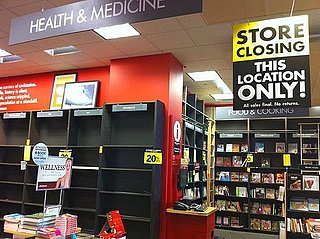
I’ve been wondering if the Kindle will one day lead to the end of the printed book. But maybe first, we should be worrying about the future of the bookstore! The picture above shows a Borders bookstore that closed in September. But now the entire Borders Group chain “may file for protection from creditors”, Bloomberg News reported last Tuesday — citing three different people who were “familiar with the matter.”
The three sources predicted that the filing could come as soon as this week, and one of them added that as many as 30% of the chain’s bookstores could close! (There’s over 500 Borders bookstores across America…) Ironically, last month Borders bookstores appeared in an episode of NBC’s “The Office” — while in real life the chain was stopping (or “delaying”) their payments to the publishers of the books Borders sells! Borders itself seems to acknowledge big changes are coming, announcing two weeks ago they’d received over half a billion dollars in funding to “provide Borders with the financial flexibility and an appropriate level of liquidity to move forward…” But further down in the press release a disclaimer noted it was contingent on “Borders’ finalization of a store closure program” to identify under-performing stores “that will be closed as soon as practicable…”
Ironically, for Barnes and Noble, that’s good news, and their stock price actually jumped up 7.4% last Tuesday. But Friday Borders stock closed at 39 cents a share — and then Monday even dropped two cents lower, down to just 35 cents a share. (Though that two cents represented 5.3% of the stock’s total value.) In fact, Borders stock may be de-listed from the New York Stock Exchange, which has a rule that every stock must be worth at least $1.00 a share. If their stock price doesn’t improve within six months, it can’t be listed on the exchange.
In the middle of the meltdown The Washington Post actually tracked down Mr. Borders himself — Louis Borders, one of the two brothers who co-founded the chain back in 1971 — at his home in Silicon Valley. (“Louis Borders declined to discuss his namesake’s problems or even whatever fondness he may hold for what’s left of his first big idea. ‘I’ve been away from the company for a while, and I just don’t want to talk about it,’ he said, before quickly hanging up.”) But they also uncovered the real story behind the closure. “Whatever progress publishers and Borders make toward a temporary deal, analysts and industry observers say the larger problem is much more daunting: There are just too many big bookstores selling a product fewer and fewer people want, at least in printed form… For many in the industry – and for this group of Borders regulars – the question is not whether the chain will go under, but when.”
Inevitably the article points at least one finger towards the popularity of new digital reading devices like the Kindle. (In the same article, the founder of Barnes and Noble jokes, “Sometimes I want to shoot
myself in the morning.”) And though the bookstore refused to talk to the newspaper’s reporter, he still looks for a reason tries to understand why. The Post notes that now Borders “confronts the limitless, more efficient supply chain of Amazon’s online emporium.” But he also looks for an answer buried deep in the company’s history.
Ironically, the company was started in 1971 because the Borders brothers had developed a new technology for booksellers! Originally the two brothers planned to license a software that they’d developed which helped predict the best-selling titles. But when they couldn’t interest the bookstores, they opened new stores themselves, and along with Barnes and Noble, created the phenomenon of superstore book-selling. “Readers rushed in for the latest Oprah Book Club pick. John Grisham became very wealthy, with one bestseller and movie after another…”
But technology continued marching forward, the Post notes. (“As the two book mega-stores clobbered each other in their battle for market share, the chains, and especially Borders, missed the next big cultural shift, analysts say.”) In fact, Borders eventually had to partner with Amazon for their web presence! By the end of the story, Amazon had developed the Kindle, Barnes and Noble created the Nook, and Borders had…nothing. “These trends were not a secret,” explains a retail expert at the Harvard Business School.
“They should have seen them coming…”